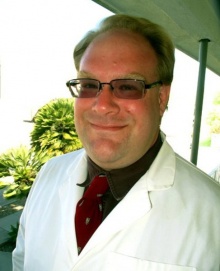
Dr. Denson Fujikawa, M.D.
Neurologist | Neurology
2254 Midvale Avenue LOS ANGELES CA, 90064About
Dr. Denson Fujikawa is a distinguished Neurologist in LOS ANGELES, CA (retired). Dr. Fujikawa specializes in diagnosing, treating, and managing disorders of the brain and nervous system. With expertise in handling complex conditions like epilepsy, multiple sclerosis, and migraines, Dr. Fujikawa employs advanced techniques and personalized treatment plans to improve patient outcomes. As a neurologist, Dr. Fujikawa is committed to staying abreast of the latest developments in neurological research and therapies.
Education and Training
University of Southern California School of Medicine Medical Degree 0
Board Certification
American Board of Psychiatry and Neurology (ABPN)
Provider Details
Expert Publications
Data provided by the National Library of Medicine- Lithium-pilocarpine-induced status epilepticus produces necrotic neurons with internucleosomal DNA fragmentation in adult rats.
- Kainic acid-induced seizures produce necrotic, not apoptotic, neurons with internucleosomal DNA cleavage: implications for programmed cell death mechanisms.
- Confusion between neuronal apoptosis and activation of programmed cell death mechanisms in acute necrotic insults.
- Status epilepticus-induced neuronal loss in humans without systemic complications or epilepsy.
- Seizure-induced neuronal necrosis: implications for programmed cell death mechanisms.
- Apoptosis: ignoring morphology and focusing on biochemical mechanisms will not eliminate confusion.
- Effects of AMPA-receptor and voltage-sensitive sodium channel blockade on high potassium-induced glutamate release and neuronal death in vivo.
- Nonconvulsive status epilepticus with frontal features: quantitating severity of subclinical epileptiform discharges provides a marker for treatment efficacy, recurrence and outcome.
- Caspase-3 is not activated in seizure-induced neuronal necrosis with internucleosomal DNA cleavage.
- Neuronal death in mesial temporal sclerosis: separating morphology from mechanism.
- Prolonged seizures and cellular injury: understanding the connection.
- Caspase-dependent programmed cell death pathways are not activated in generalized seizure-induced neuronal death.
- Mild as well as severe insults produce necrotic, not apoptotic, cells: evidence from 60-min seizures.
- Nuclear translocation of mitochondrial cytochrome c, lysosomal cathepsins B and D, and three other death-promoting proteins within the first 60 minutes of generalized seizures.
- Single-dose phenytoin infusion.
Areas of expertise and specialization
Faculty Titles & Positions
- Health Sciences Clinical Professor of Neurology 2011 -
Professional Memberships
- American Association of Neurology Fellow, American Neurological Association Fellow, American Epilepsy Society Fellow
Professional Society Memberships
- American Association of Neurology Fellow, American Neurological Association Fellow, American Epilepsy Society Fellow
Articles and Publications
- 34 peer-reviewed articles, Editor of Acute Neuronal Injury, !st and 2nd editions
What do you attribute your success to?
- Hard work and perseverance
Areas of research
- Programmed mechanisms of neuronal necrosis
Areas of research
Programmed mechanisms of acute neuronal necrosis
Dr. Denson Fujikawa, M.D.'s Practice location
Dr. Denson Fujikawa, M.D.'s reviews
Write ReviewMedia Releases
Get to know more about Neurologist Dr. Denson G. Fujikawa, who serves patients in Los Angeles, California.
Dr. Fujikawa is a highly trained neurologist and neuroscientist at the UCLA Brain Research Institute in Los Angeles, California.
The UCLA Brain Research Institute (BRI) is a catalyst for education, outreach, and research collaborations among current and future scientists, engineers, and clinicians who seek to understand the healthy and diseased brain.
Formed in 1959 by a small cadre of neuroscientists, the BRI is one of the first neuroscience research collectives established in the United States. Now with approximately 300 faculty members representing nearly 30 departments from 6 schools, the institute is UCLA’s central force in its mission to advance interdisciplinary basic and clinical neuroscience.
A member of the faculty at David Geffen School of Medicine at UCLA, Dr. Fujikawa joined the Department of Neurology as a Clinical Instructor in 1981. He has also been on staff at the Sepulveda VA Ambulatory Care Center since 1983, became an Adjunct Professor in 1996, and changed series to become a Health Sciences Clinical Professor of Neurology in 2011.
Receiving his Bachelor of Arts degree in Psychology, magna cum laude, at Harvard University, Dr. Fujikawa earned his medical degree from the University of Southern California School of Medicine. He did two years of residency in general surgery at Columbia-Presbyterian Medical Center in New York, two years of residency in neurosurgery at UCLA Medical Center, then switched to neurology, completing his residency at Harbor-UCLA Medical Center in 1981.
Thereafter, he spent two years as a research fellow in Dr. Claude Wasterlain’s Epilepsy Research Laboratory at Sepulveda. He spends half his time in clinical neurology, training UCLA neurology residents, with a subspecialty interest in epilepsy, and half his time doing basic research on in vivo mechanisms of naturally occurring apoptotic and pathologically induced necrotic neuronal death.
Possessing over five decades of clinical excellence, the doctor is board-certified in neurology by the American Board of Psychiatry and Neurology (ABPN). The ABPN is a not-for-profit corporation dedicated to promoting high-quality patient care for the public through the initial and continuing certification of psychiatrists and neurologists.
Achieving professional competence, Dr. Fujikawa is a Fellow of the American Academy of Neurology Fellow (FAAN), a Fellow of the American Neurological Association (FANA), and a Fellow of the
Neurology is a branch of medicine dealing with disorders of the nervous system. Neurologists are licensed medical specialists who diagnose and treat disorders that affect the brain, spinal cord, nerves, and muscles of patients. They examine a patient’s mental and physical status, conduct medical tests and scans, and evaluate the results to diagnose and treat the patient.
Recommended Articles
- Michael J. Fox's Impact on Parkinson’s Disease
Michael J. FoxMichael J. Fox, born as Michael Andrew Fox in 1961, is a Canadian-born actor, who received his breakthrough in Family Ties, an American sitcom. He consecutively received three Emmy awards as lead actor in this comedy series. He was the lead character in the adventure comedy film, Back...
- Alternative Treatments for Stroke
Knowing about the treatment and care of stroke victims is important. When a victim shows stroke-like signs and symptoms, a neurologist must confirm the symptoms as well as identify the type of stroke the victim is suffering from, the affected areas, and the level of damage. This will help in...
- Rock Steady Boxing: A Pow to Parkinson's Disease
The Rock Steady Boxing organization is a group created to give power back to Parkinson’s patients, and to help them partially recover their functionality and lessen the impact of their disease through a non-contact boxing-based fitness regimen. The organization aims to help the 1,000,000+...
- Tommy Hilfiger Now Offers Clothing Line For People With Disabilities
Coming down with a chronic disease or being born with a disability can be a very serious issue, especially if left untreated. As most know, a condition like Duchenne muscular dystrophy can alter the patient’s lives, forcing them and their caregivers to adopt different lifestyle habits to...
- What is A Partial Seizure?
Seizure is a brain abnormality which is caused by a surge in the brain’s electrical activity. It can affect the entire brain and can cause visual disturbances, muscle contractions and blackouts. Partial seizure is described as a seizure which happens in one area of the brain. Partial seizure may...
- Fasting Style Diet May Help Ease Symptoms of Multiple Sclerosis
Multiple sclerosis has been the subject of numerous studies that have tried to figure out ways to fight and prevent the disease. One recent finding could be the key to discovering more about multiple sclerosis, and it has to do with the disease's waste disposal.Waste Disposal ExplainedLike most...
Nearby Providers
- Moshe-Samuel Hendizadeh10966 W Pico Blvd Los Angeles CA 90064
- Mr. Aaron David Licker L.AC.2990 Overland Blvd Los Angeles CA 90064
- Dr. Po Haong Lu PHD11835 W OLYMPIC BLVD STE 1265E LOS ANGELES CA 90064






